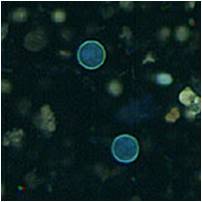Cyclospora is a microscopic parasite that can cause an intestinal infection known as cyclosporiasis. This parasite is responsible for the disease cyclosporiasis, which primarily affects the small intestine. Cyclospora cayetanensis is the specific species associated with human infections.
Symptoms:
Symptoms of cyclosporiasis can vary but often include:
- Watery Diarrhea: This is a common symptom and can be prolonged.
- Fatigue
- Loss of Appetite
- Weight Loss
- Abdominal Cramps
- Nausea
- Flu-like Symptoms
Symptoms typically develop about 7 days after ingestion of the contaminated food or water.
Causes:
Cyclospora is usually transmitted through the ingestion of contaminated food or water. The oocysts (egg-like forms of the parasite) are too small to be seen without a microscope. Contaminated produce, such as fresh fruits and vegetables, has been a common source of outbreaks. Cyclospora requires days to weeks after being passed in a bowel movement to become infectious for another person. Therefore, direct person-to-person transmission is unlikely.
Treatment:
Cyclosporiasis is treated with specific antibiotics. Trimethoprim-sulfamethoxazole (Bactrim), is the most common drug used. If left untreated, the illness may last for a few days to a month or longer and may return.
It’s essential to consult a healthcare professional for a proper diagnosis and prescription of appropriate medications.
Prevention:
- Food Safety: Practice good food safety habits, including washing fruits and vegetables thoroughly, especially those that are eaten raw.
- Water Safety: Consume clean and safe water, and avoid drinking untreated water.
- Personal Hygiene: Practice good personal hygiene, including washing hands thoroughly after using the toilet and before handling food.
- Travel Precautions: Be cautious when traveling to areas where cyclosporiasis is more common, and follow recommended guidelines for food and water safety.
- Avoid Contaminated Water: Avoid swimming in or drinking water from potentially contaminated sources.

































